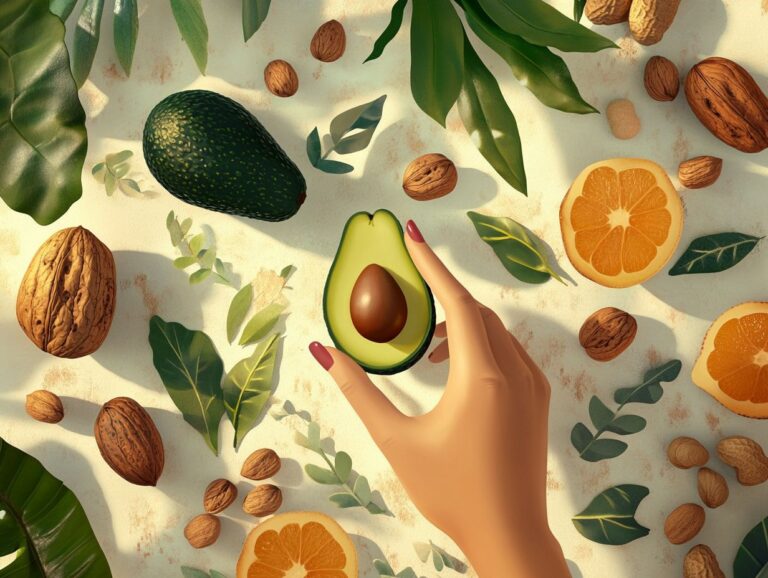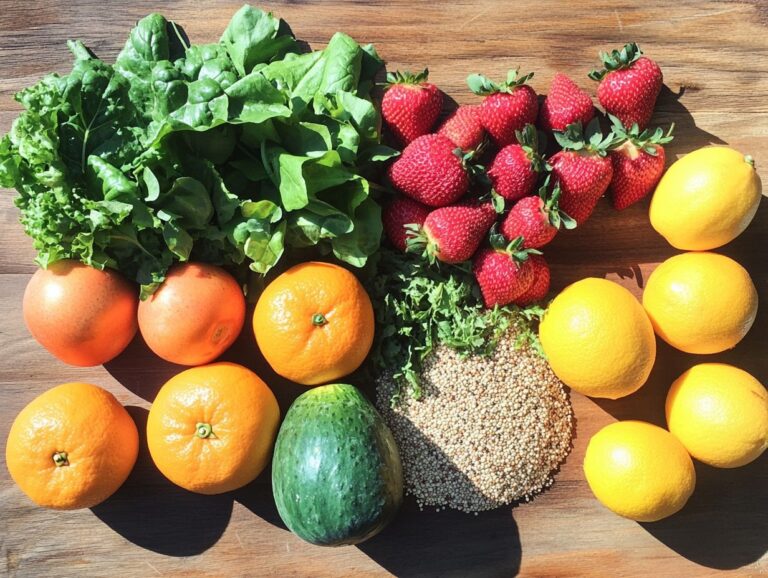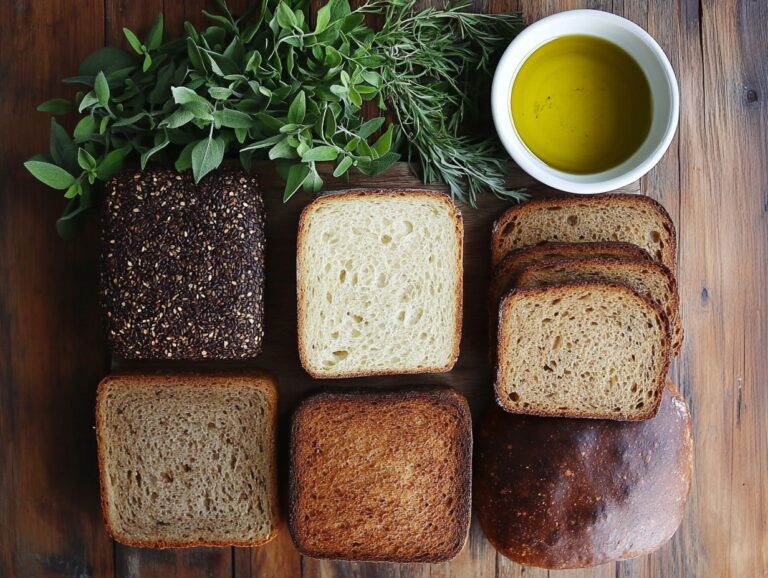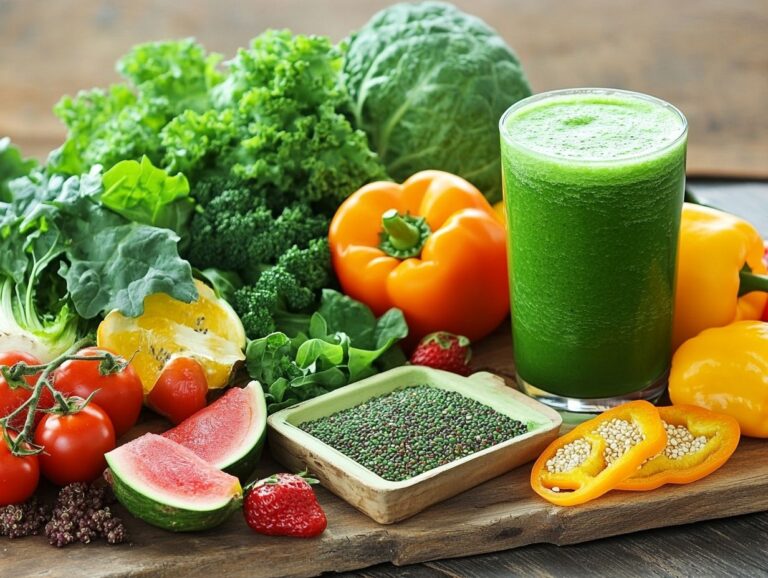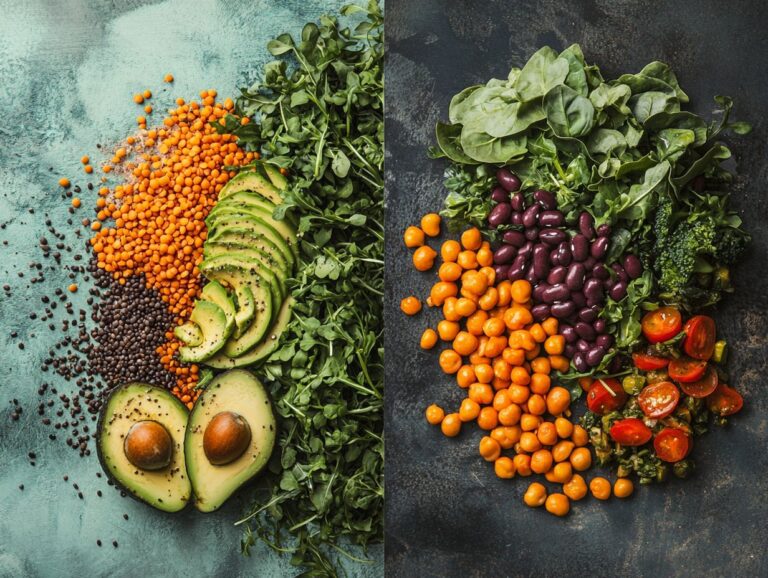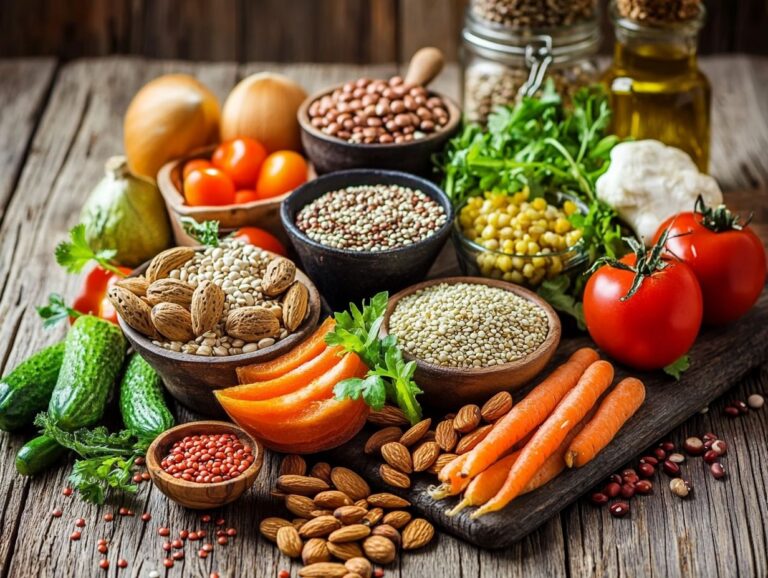The raw vegan diet is an invigorating lifestyle that focuses on the consumption of unprocessed fruits, vegetables, nuts, and seeds. This dietary approach offers numerous health benefits and promotes sustainability. This article explores what a raw vegan diet entails, highlights its advantages—such as increased nutrient intake and improved digestion—and discusses some potential drawbacks. Additionally, the article offers tips for creating a balanced meal plan, includes sample menus, and provides strategies for successfully navigating this fresh, whole-foods journey.
Key Takeaways:
- A raw vegan diet is based on whole, unprocessed, plant-based foods that are not heated above 118°F.
- Choosing a raw vegan diet can offer numerous health benefits, including increased nutrient intake, improved digestion, weight loss, and reduced inflammation.
- To thrive on a raw vegan diet, it is important to plan for balanced meals, listen to your body, stay hydrated, and seek support and guidance.
What Is A Raw Vegan Diet?

A raw vegan diet is an eating approach that combines the principles of a vegan diet with those of a raw food diet. This means that raw vegan diets consist of whole foods that have not been heated above 118°F (48°C), aligning with the raw food principles of minimizing cooking methods that alter the natural state of foods.
Such a diet includes fresh fruits, vegetables, nuts, seeds, legumes, and grains, all considered nutrient-rich foods. Like all vegan dietary plans, this way of eating aims to promote health and well-being while avoiding processed foods and animal products, ensuring a high nutrition intake.
Why Choose A Raw Vegan Diet?
A raw vegan diet is a healthy eating style that focuses on good nutrition, fresh and unprocessed foods, and sustainable lifestyle practices, emphasizing a plant-based meal that supports health freedom and sustainable living.
People choose a raw vegan diet mainly because it can promote good health, offering benefits such as improved digestion, increased energy levels, and a stronger immune system, while also supporting heart health and diabetes management.
Additionally, many individuals are drawn to this diet due to the philosophy of veganism, which emphasizes respect for animal rights and environmental sustainability.
Is It Healthier Than Other Diets?
The health benefits of a raw vegan diet are often considered superior to those of other dietary options due to its emphasis on raw, nutrient-dense foods and a reduced intake of processed items, leading to potential weight loss and better nutrient balance.
However, there are significant health risks associated with potential nutrient deficiencies, such as vitamin B12, calcium, and vitamin D, if these diets are not carefully planned or if food safety practices are neglected. The appeal of a raw diet lies in its high concentration of vitamins, minerals, and antioxidants, fostering health awareness and health sovereignty.
Nevertheless, it necessitates a deeper understanding of how to obtain essential nutrients like proteins and omega-3 fatty acids, which can be challenging without meticulous ingredient selection and consideration of food contaminants and food systems.
While cooking methods may reduce certain nutrients (which are never entirely lost), they also enhance food safety by killing harmful pathogens. Therefore, it is crucial for anyone adopting this lifestyle to educate themselves about food sourcing and preparation techniques, as well as the potential risks associated with raw foods, to ensure improved long-term health outcomes and maintain health sovereignty through mindful eating and food empowerment.
What Are The Benefits Of A Raw Vegan Diet?
The advantages of a raw vegan diet are numerous and can significantly enhance an individual’s overall health and wellness.
This nutrient-rich diet emphasizes the consumption of fresh fruits and vegetables, which improves nutrient intake while also supporting better digestion, weight loss, and reduced inflammation. These benefits make it a popular choice among those seeking a healthier lifestyle.
1. Increased Nutrient Intake
One of the most notable benefits of a raw vegan diet is the higher intake of nutrients that comes from a diverse array of healthy foods, including fresh fruits and vegetables, nuts, and seeds.
This diet allows individuals to consume a wide range of vitamins, minerals, and antioxidants that are often diminished in processed or cooked foods, promoting a healthy lifestyle and enhancing culinary creativity.
For example, vitamin C, which is abundant in citrus fruits and leafy greens, and vitamin A, found in brightly colored vegetables such as carrots and sweet potatoes, can be significantly increased through this lifestyle.
Additionally, raw nuts and seeds are excellent sources of healthy fats, providing essential vitamin E and minerals such as magnesium and zinc, contributing to heart health and reducing inflammation.
To maximize the benefits of this lifestyle, it is important to consume a colorful variety of produce, ensuring a balanced intake of the nutrients necessary for overall health, maintaining nutrient balance and supporting sustainable living.
2. Improved Digestion
A raw vegan diet offers several notable benefits, one of which is improved digestion. The abundance of fiber-rich raw foods, such as fruits, vegetables, and whole grains, promotes regular bowel movements and supports a healthy gut microbiome.
Many individuals report feeling lighter and more energized when following this dietary approach. This enhanced digestive process is primarily due to the high levels of dietary fiber found in these foods, which not only helps move waste through the digestive tract but also fosters a thriving community of beneficial bacteria, enhancing health awareness and reinforcing food safety.
Additionally, raw foods retain natural enzymes that assist in breaking down complex nutrients, facilitating easier absorption. As digestion improves, individuals often experience fewer episodes of bloating and discomfort, significantly enhancing their overall well-being.
These positive changes can influence energy levels and even bolster a stronger immune system, highlighting the interconnectedness of digestion and holistic health benefits.
3. Weight Loss
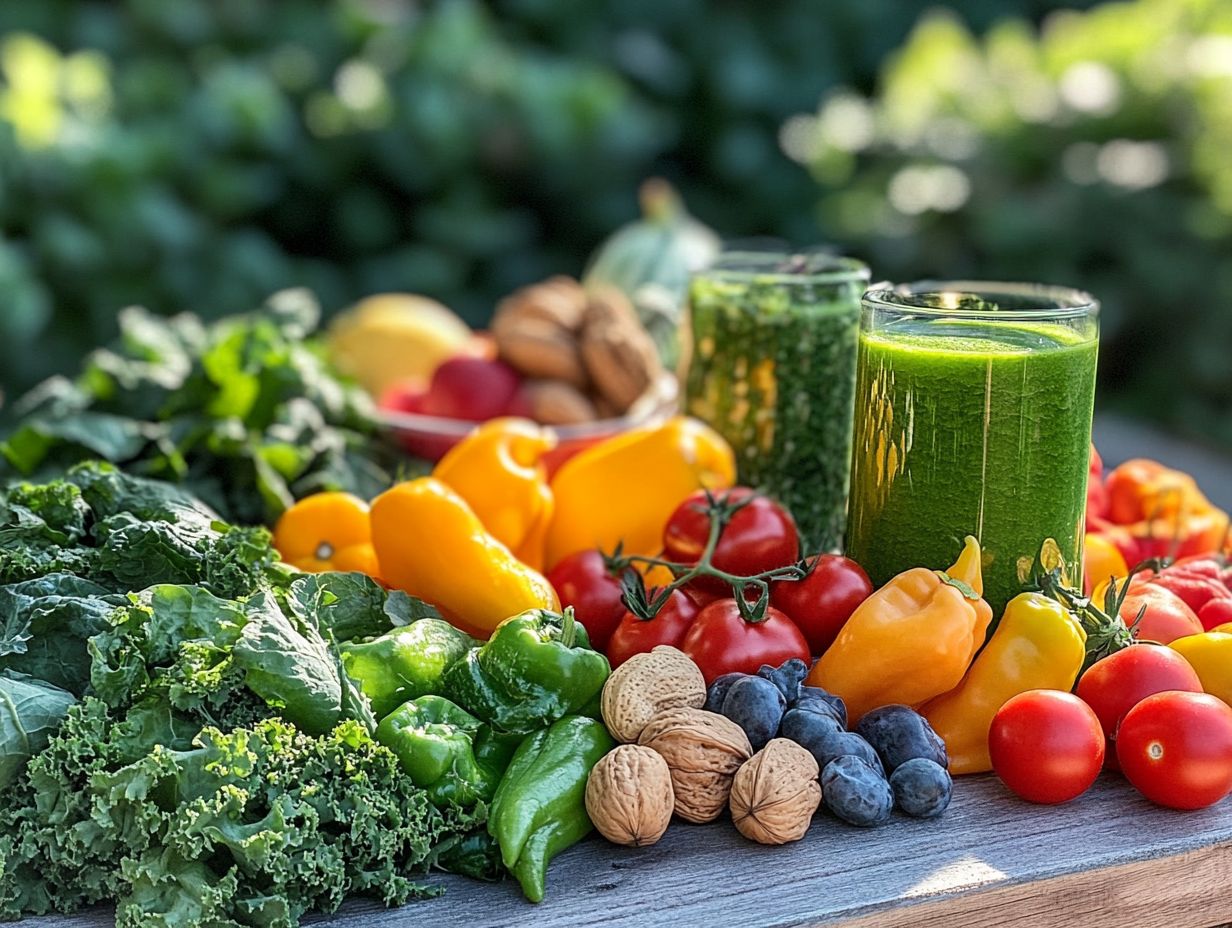
Weight loss is one of the primary benefits of a raw vegan diet, as this dietary approach promotes the consumption of low-calorie, high-fiber foods, which leads to calorie restriction.
Meals are satisfying enough to curb hunger while simultaneously encouraging healthy eating habits. Individuals following a raw vegan diet consume only fruits, vegetables, nuts, and seeds, which are typically low in calories.
Incorporating high-fiber foods, such as leafy greens and whole fruits, enhances feelings of fullness, resulting in a reduction in total daily calorie intake. Introducing a variety of textures and flavors into meals can help prevent boredom and improve adherence to the diet.
Simple strategies, such as meal prepping and keeping healthy snacks on hand, can assist individuals in losing weight by maintaining energy levels and curbing hunger, all while staying within their dietary restrictions and adhering to raw food principles.
4. Reduced Inflammation
One of the greatest benefits of a raw vegan diet is its ability to reduce inflammation. Many foods included in this diet, such as fresh vegetables, fruits, and nuts, possess anti-inflammatory properties.
A plant-based diet rich in these foods can help diminish chronic inflammation and enhance overall health. For example, dark leafy greens like spinach and kale are high in antioxidants and vitamins that help reduce inflammatory markers in the body.
Fruits such as berries and oranges provide essential vitamins and phytonutrients that can strengthen the immune system. Additionally, nuts and seeds like walnuts and flaxseeds are rich in omega-3 fatty acids, which contribute to lowering inflammation.
What Are The Potential Drawbacks Of A Raw Vegan Diet?
The raw vegan diet offers numerous health benefits, but it also presents potential drawbacks that individuals should consider before adopting this lifestyle, including foodborne illness and challenges in food handling.
These drawbacks include:
- The risk of nutrient deficiencies
- Challenges in meeting calorie requirements
- Social isolation due to dietary restrictions
- The risk of foodborne illnesses associated with consuming raw foods
1. Nutrient Deficiencies
The most concerning nutrient deficiencies for individuals following a raw vegan diet include vitamin B12, calcium, iron, and omega-3 fatty acids. These deficiencies are likely to arise if individuals do not plan their meals carefully to ensure they receive adequate nutrition from a variety of sources, particularly when the diet lacks alternative dairy and fortified foods.
Proper meal planning is essential for anyone practicing this lifestyle to maintain balance and overall health. Incorporating fortified foods, such as nutritional yeast for vitamin B12, along with a diverse range of leafy greens, nuts, seeds, and legumes, can significantly enhance nutrient intake.
Almonds and sesame seeds are excellent sources of calcium, while dark leafy greens and dried fruits provide good amounts of iron. Additionally, incorporating chia seeds or flaxseeds into daily meals can help meet the body’s omega-3 fatty acid requirements.
This approach not only improves the nutritional quality of the diet but also fosters a better understanding of how to support the body’s health effectively.
2. Difficulty Meeting Calorie Needs
The main drawbacks of a raw vegan diet include the difficulty in meeting daily calorie needs. Because this diet emphasizes low-calorie and high-fiber foods such as fruits and vegetables, individuals may struggle to consume enough calories, which can lead to feelings of dissatisfaction. Careful meal planning and proper food storage are often necessary to ensure calorie requirements are met.
To address these challenges, individuals can take several steps involving food preparation and raw meal planning:
- Prioritize energy-dense foods: Incorporating fats from nuts, seeds, and avocados can provide essential dietary fat and calories without adding excess bulk.
- Choose a variety of fruits and vegetables: Including a diverse range of colors and flavors in meals enhances overall nutrition.
- Plan meals in advance: This helps prevent impulsive choices that may result in inadequate calorie intake.
- Use proper food storage: This preserves the quality of ingredients and supports a consistent dietary lifestyle.
Additionally, foods like smoothies and raw energy bars can be effective options for increasing calorie consumption, which can be particularly important for those following vegan diets or plant-based meal plans.
3. Social Isolation
One significant disadvantage of the raw vegan diet is the potential for social isolation. Dietary restrictions can limit restaurant choices and social events centered around food, making social interactions more challenging.
Individuals following this lifestyle may find it difficult to connect with friends and family who do not share their dietary choices. The emotional toll of feeling excluded and misunderstood can lead to increased isolation.
To alleviate these feelings, it can be helpful to proactively engage in conversations about dietary preferences, suggest alternative restaurants that offer plant-based options, or even host events where raw vegan dishes take center stage.
Additionally, seeking out communities with similar eating habits, whether through social media or in local neighborhoods, can help individuals feel less lonely on their journey.
How To Create A Balanced Raw Vegan Meal Plan?
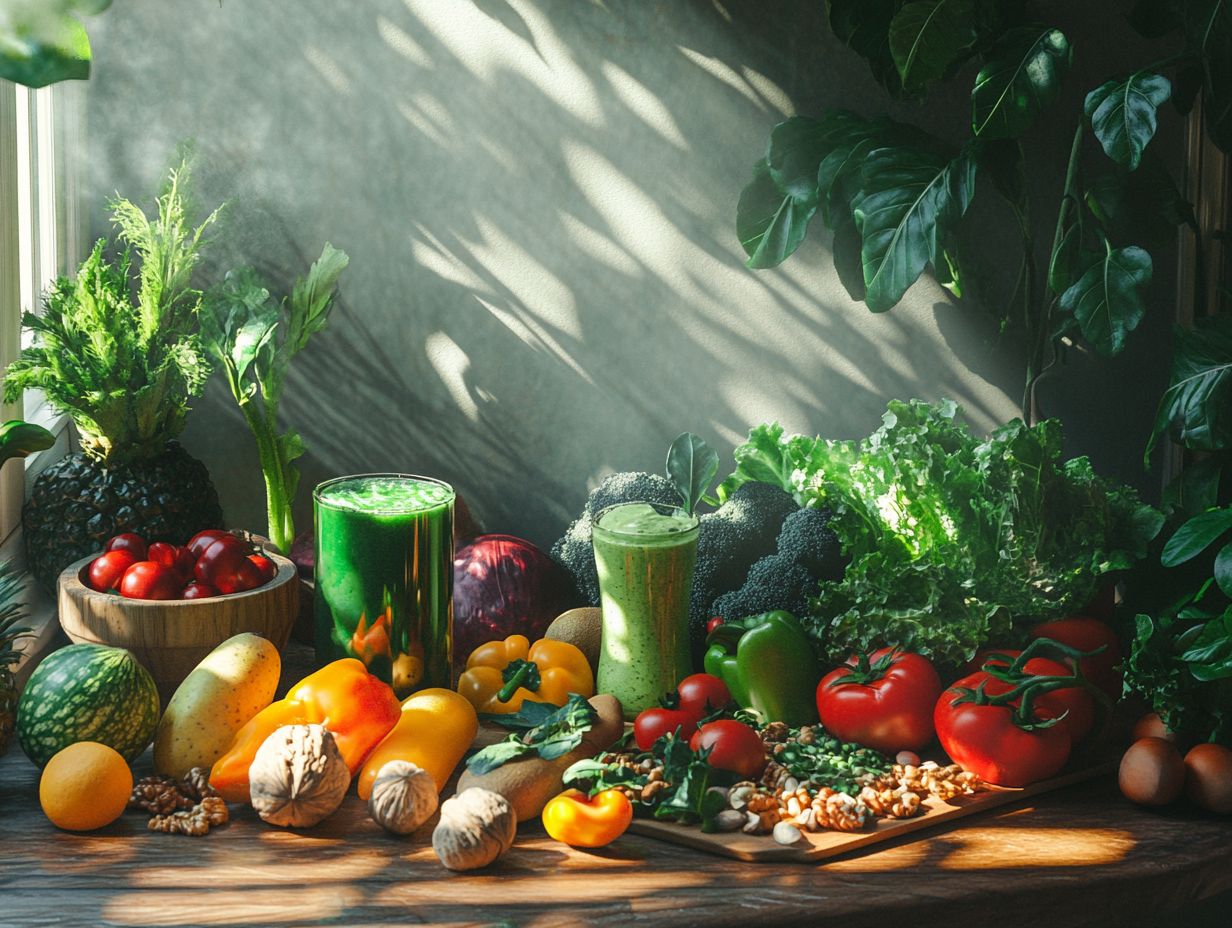
A balanced raw vegan meal plan is crucial for ensuring adequate nutrient intake and maintaining a healthy lifestyle, which includes high nutrition and health benefits associated with whole foods.
An effective meal plan should incorporate a variety of fresh fruits and vegetables, healthy fats, and proteins to support energy levels and overall well-being. Including nutrient-rich foods helps in achieving this goal.
1. Base Meals Around Fresh Fruits And Vegetables
A balanced raw vegan meal plan focuses on fresh fruits and vegetables, as they serve as the primary sources of nutrients in raw meals. These foods provide essential vitamins, minerals, and antioxidants necessary for optimal health.
Increasing the variety and color of produce not only enhances the visual appeal of meals but also boosts their nutritional content, which is a core aspect of mindful eating and culinary creativity.
For breakfast, consider a smoothie bowl made with fresh fruits:
- Bananas
- Berries
- Chia seeds
- Almond butter
For lunch, try a kale salad featuring:
- Cherry tomatoes
- Cucumber
- Carrot
- Lemon juice
For dinner, enjoy a stir-fry with:
- Zucchini noodles
- Bell peppers
- Carrots
- Cashew cream
These examples represent just a few of the many raw vegan meals that can help ensure the body is well-nourished and content, while also improving digestion and heart health.
2. Incorporate Healthy Fats And Proteins
Incorporating healthy fats and proteins into a raw vegan meal plan is essential for maintaining a balanced diet and supporting energy levels. Including sources of healthy fats and proteins such as avocados, nuts, seeds, and legumes can help achieve this objective.
These nutrient-dense foods not only promote optimal health but also enhance feelings of fullness, reducing the likelihood of unhealthy cravings. For instance, a breakfast smoothie made with almond butter, chia seeds, and a splash of coconut milk offers a delicious energy boost. Snacking on a combination of walnuts and pumpkin seeds provides valuable omega-3 fatty acids and plant-based protein to help stave off hunger.
By experimenting with a diverse array of raw food recipes, such as a raw vegan taco salad featuring almond guacamole and sprouted lentils, individuals can enjoy a variety of flavorful options while also meeting their daily nutritional goals.
3. Include Variety And Color In Meals
Incorporating variety and color into raw vegan meals not only ensures a broader range of nutrients but also enhances visual appeal. Culinary creativity can be employed to prepare vibrant dishes that showcase the full spectrum of fresh produce available.
Adding a mix of textures and flavors elevates the taste and overall experience of a meal, transforming even the simplest dish into a delightful culinary experience. For instance, pairing crunchy red bell peppers with creamy avocado not only enhances visual appeal but also combines vitamin C with healthy fats.
Utilizing seasonal fruits and vegetables keeps the kitchen dynamic and exciting. A combination of vibrant purple cabbage, bright orange carrots, and zesty yellow citrus can create a visually stunning and nourishing salad bowl.
It’s important to include a variety of leafy greens, nuts, and seeds to enrich each dish, ensuring that it is not only beautiful but also packed with essential nutrients.
4. Plan For Adequate Nutrient Intake
Meal planning for nutrient adequacy and the prevention of deficiencies is essential in a raw vegan diet. This can be achieved by ensuring a variety of foods that include all essential vitamins and minerals.
By incorporating a wide range of fruits, vegetables, nuts, and seeds, individuals can create a balanced meal plan that meets their dietary needs. It is also important to combine foods in a way that enhances nutrient absorption, such as pairing vitamin C-rich foods with iron-rich foods.
Batch cooking and preparing healthy, nutrient-rich snacks are additional strategies to promote meal variety and facilitate adherence to the raw vegan diet, while also preventing nutrient deficiencies.
Consulting with a healthcare provider or nutritionist can help tailor the meal plan to the individual’s needs, ensuring that all important nutrients, such as vitamin B12, calcium, and vitamin D, are adequately included in their diet.
What Are Some Sample Raw Vegan Meal Plans?
Sample raw vegan meal plans consist of recipes and meal ideas that individuals can use for guidance or inspiration when adopting this healthy diet.
These plans embody the culinary creativity of raw food cuisine and highlight the diversity of raw food recipes and meal options available, which can help prevent nutrient deficiencies and ensure a balanced diet.
1. Beginner’s 3-Day Meal Plan
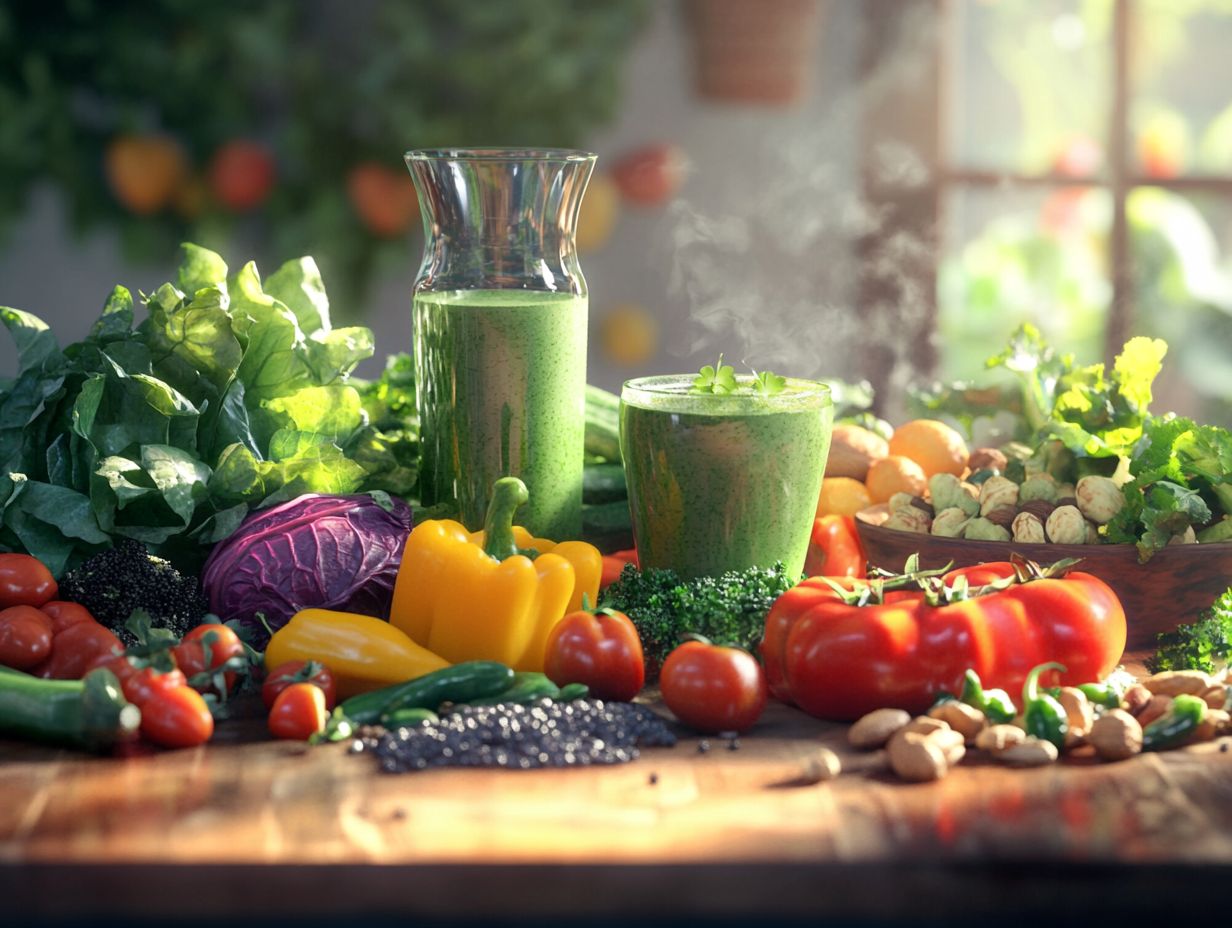
A beginner’s 3-day meal plan features easy and accessible meal ideas aimed at helping newcomers to the raw vegan diet transition smoothly into this new lifestyle.
The plan is thoughtfully designed to make the transition enjoyable by incorporating bright colors and flavors, ensuring that the experience is pleasant rather than challenging.
For beginners, utilizing simple recipes and minimal cooking tools is essential. Fresh fruits, vegetables, nuts, and seeds are key components of this discovery process, allowing individuals to explore the foundational flavors of raw foods.
By familiarizing themselves with these nutrient-dense options, they can fully appreciate the health benefits associated with a diet centered around such foods, which supports heart health and improved digestion.
2. Advanced 7-Day Meal Plan
An advanced 7-day meal plan for raw vegans provides a diverse and nutrient-rich selection of meals that not only challenges culinary creativity but also allows for a deeper exploration of raw food recipes.
This meticulously curated plan highlights the versatility of fruits, vegetables, nuts, seeds, and legumes while introducing sophisticated techniques such as dehydrating, sprouting, and fermenting.
By incorporating nutrient-dense ingredients like spirulina, zesty citrus dressings, and a variety of vibrant superfoods, individuals can enhance their raw culinary experience, which aligns with the philosophy of raw foodism and health sovereignty.
Each day’s menu is thoughtfully designed to include a range of textures and flavors, ensuring that every meal is both satisfying and visually appealing.
With a focus on seasonal and local produce, this advanced meal plan encourages enthusiasts to embrace the rich tapestry of raw vegan cuisine that nourishes both the body and the mind, and supports health awareness and sustainable living.
What Are Some Tips For Thriving On A Raw Vegan Diet?
Individuals who follow a raw vegan diet prioritize health awareness, mindfulness, and sustainability.
They ensure they stay hydrated, pay attention to their body’s signals, and seek community support to navigate the challenges associated with this diet, which aligns with the principles of veganism and health freedom.
1. Listen To Your Body
Listening to your body is essential for thriving on a raw vegan diet, as it enables individuals to recognize their unique nutritional needs and adjust their dietary choices accordingly. This practice fosters a deeper connection to one’s health and well-being.
By paying attention to signals such as hunger cues, energy levels, and cravings, individuals can tailor their raw food choices to better meet their physiological demands. This mindfulness encourages a more intuitive approach to eating, allowing for the inclusion of a diverse range of fruits, vegetables, and nuts that align with specific health goals.
As a result, being attuned to bodily signals not only facilitates informed food choices but also enhances digestion, boosts energy, and promotes overall vitality. Ultimately, this practice give the power tos individuals to cultivate a sustainable and nourishing lifestyle that honors their body’s innate wisdom.
2. Stay Hydrated
Hydration is essential on a raw vegan diet because many fresh produce items have a high water content that aids in hydration while also providing necessary nutrients. Proper hydration supports digestion and overall health.
In this lifestyle, consuming a variety of fruits and vegetables not only enhances hydration but also improves nutrient absorption. Foods such as cucumbers, watermelon, and leafy greens are particularly beneficial, as they are rich in water, vitamins, and minerals crucial for the body’s functioning.
Additionally, drinking water is vital, as it supports various bodily processes, helps flush out toxins, and regulates body temperature, which is crucial for maintaining a healthy lifestyle and promoting heart health.
For individuals following a raw vegan diet, balancing the intake of water-dense foods with pure water can lead to higher energy levels and improved skin health, ultimately promoting a holistic approach to wellness. Including fresh fruits and fresh vegetables, as well as ensuring adequate nutrient balance, can help prevent nutrient deficiencies often associated with restrictive diets.
3. Be Prepared For Social Situations
Preparing for social situations is essential to navigate the challenges of a raw vegan diet, as the dietary restrictions can complicate dining out or participating in social gatherings. Understanding raw food principles and planning around nutrient-rich foods can make these situations more manageable. Having a well-thought-out plan can help ensure that one’s dietary preferences are acknowledged and supported by others.
To effectively manage these situations, it is important to communicate preferences clearly with close friends and family in advance. When invited to an event, it is advisable to inform the host of any dietary restrictions while suggesting some easy-to-prepare and delicious raw vegan options they might consider, such as a raw meal plan incorporating plant-based meals and whole foods.
Bringing along portable snacks or a raw meal can also ensure that one can enjoy the social aspects of the event without feeling deprived. Practicing mindfulness during meals can enhance the overall experience and often encourages those around the raw vegan individual to appreciate the freshness and health benefits of raw ingredients.
This can lead to fruitful discussions about various dietary preferences, including the health benefits of raw diets and veganism philosophy.
4. Get Support And Guidance
Support and guidance from the raw vegan community can significantly enhance one’s experience and success on this diet by offering valuable resources, meal ideas, and emotional encouragement. Engaging with this community can also boost awareness of food safety regarding raw foodism and the associated health risks and benefits.
Connecting with others who share similar dietary choices fosters health sovereignty and food empowerment. The collective knowledge of this community serves as a vital resource for anyone transitioning to or maintaining a raw vegan lifestyle, with insights into nutrient balance and the benefits of sustainable living.
Online forums, local gatherings, and social media groups serve as information goldmines where individuals share their experiences, recommend raw food recipes, and discuss the challenges they encounter, including dealing with dietary restrictions and optimizing food preparation for improved digestion.
Workshops and support groups often feature seasoned raw vegan practitioners who provide helpful tips on optimizing nutrition and culinary creativity. They cover topics such as alternative dairy options, food handling, and mindful eating. Within these shared spaces, members find motivation and accountability, fostering a sense of belonging that is essential for the success of their personal dietary journeys.
